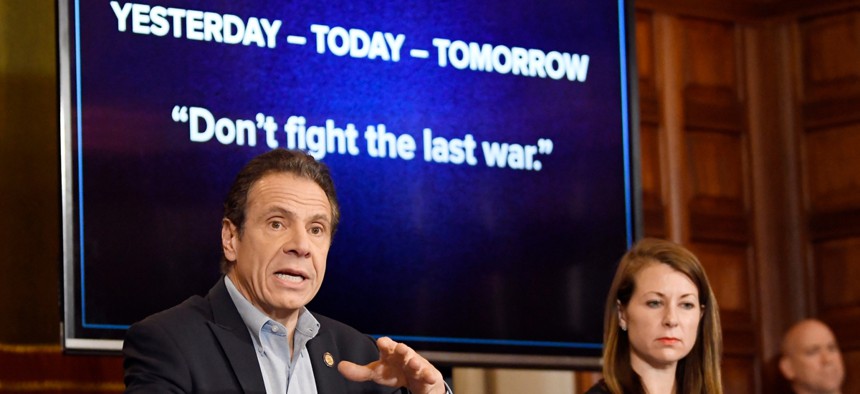The Big Lesson of 2020

New York Gov. Andrew Cuomo discussing the coronavirus pandemic during a news conference. SHUTTERSTOCK/HANS PENNINK
COMMENTARY | 2020 should teach all of us that we can no longer ignore our biggest challenges.
It’s that time of year when we reflect on the events of the past year and look to the new year with hope and optimism at the chance to start over and do better. Thinking of 2020, I think it’s safe to say that this year will go down as not just a bad year but the worst year we’ve collectively experienced in recent history.
Almost every month seemed to unleash a new plague that state and local governments were at the forefront of addressing. March brought the first wave of the coronavirus. April gave us record-breaking unemployment filings. May saw the tragic police killing of George Floyd, which sparked Black Lives Matter protests across the country in June and subsequent calls to change police funding. The fourth of July holidays brought with it a resurgence of coronavirus. August saw another year of devastating wildfires in Western states that grew so large that the smoke spread all the way to the East Coast. September and October gave us record breaking number of storms leading us to the most active hurricane season ever. October also unveiled attempted plots to kidnap Michigan Gov. Gretchen Whitmer and Virginia Gov. Ralph Northam. November saw state and local officials overseeing a highly contentious presidential election process. And now in December, when we should be celebrating the approval of two coronavirus vaccines, hospitals across the country are reaching breaking points in treating coronavirus patients as ICU capacity plunges to all-time lows.
When you see it written out like that, it seems unfathomable to think that all of those events occurred in this year alone. If Hollywood had written this script, it would've fallen into the fantasy genre because of how unrealistic it sounds on paper. And yet this has very much been our reality.
The simultaneous nature in which these events unfolded made sure this extraordinary year will live forever in our memories. Unfortunately, while we are all eager to leave 2020 behind, most of the trials and tribulations that occurred will follow us deep into 2021 and beyond.
State and local governments know this all too well. The toll the pandemic has taken—19 million Americans and counting infected and more than 330,000 people dead—is devastating. Yet, this is still the beginning of a long journey. A journey that could forever alter how cities, counties and states operate. Even when the pandemic ends, state and local leaders will be dealing with the lingering consequences, including budget shortfalls, staggering unemployment, widespread business closures and a depleted public health infrastructure.
This tragedy and trauma we’ve experienced this year has left many of us wondering: What is the point? And what lesson should we learn? There’s one clear answer that we need to come to terms with before we start a new chapter. This is it: We can’t continue to kick the can down the road on complex societal challenges without getting kicked back hard.
While our inadequate, patchwork response certainly contributed to more dire outcomes than any other country in the world, our true Achilles’ heel has been leaving our critical weaknesses largely ignored despite constant warnings and pleas to do so.
Take for instance how experts warned for almost a decade that the country was unprepared for a pandemic. These warnings were met with years of public health funding and personnel cuts. Cue the coronavirus, which proved all previous predictions right as it seeped into every part of our lives and completely upended them. Plus, the years of depleting our public health departments placed the country at a deep disadvantage—one that still exists today—in key areas to mitigate the spread of the virus. At this point in the pandemic, we tragically remain behind on testing, contact tracing and personal protective equipment. What’s particularly worrisome is a similar pattern of passive, apathetic action is occurring in other major areas like climate change and race relations. This shows we still haven’t learned our lesson and aren’t doing enough to address our historic problems.
The blame for inaction doesn’t rest with state and local governments alone. The fraying intergovernmental relationship that has declined for years is a major factor. And the lack of major federal investments in areas that desperately need it has intensified the difficulties for state and local governments to properly address our challenges.
Now, we need people in positions of power to recognize the past mistakes of inaction and understand that we cannot wait to solve our problems until the worst is already here. Otherwise, we will continue to play catch up just to stay afloat. In other words, we can no longer afford to be reactive. Rather, this should be the time when all levels of government work together to become proactive.
That means addressing our nations decaying infrastructure before a major infrastructure failure by developing, implementing and funding a comprehensive plan to address all of our critical infrastructure sectors.
It means addressing climate change before the damage to the environment is irreversible by investing in clean energy projects, while curbing carbon emissions similar to the recent plan proposed by several Midwestern and Appalachian mayors.
It means addressing our depleted public health infrastructure before the next pandemic. Instead of further funding reductions to public health departments, which is already starting to occur, we need to recognize public health as a critical part of our economy and provide adequate investment in people, equipment and resources so that we are ready to respond to threats.
It also means addressing institutionalized racism before another unarmed Black or brown person is killed at the hands of the police by first acknowledging its existence like several cities and states have in declaring racism a public health crisis. But we can’t stop there. States and municipalities must also remove laws that perpetuate racial injustices like exclusionary zoning policies and invest in making amends for racist policies through reparations or programs that strike at the heart of disparities in public health, housing and economic development.
Most importantly, we shouldn’t wait until these issues get to a point of peril. Instead, our state, local and federal leaders must work together to deal with these issues along the way, so they aren’t so grave, deep or all-encompassing. Hopefully, the incoming Biden-Harris administration will stick to their pledge to “being real partners” with state and local officials, not only to respond to our current crisis but those yet to come.
We will be mired down in a national emergency for the foreseeable future. But in the spirit of the new year and new beginnings perhaps our state and local leaders can begin to adjust their approach by taking actions today to not just manage our deepest problems but solve them. This is the opening to make that change. Now let’s hope our leaders take it.
Alisha Powell Gillis is the senior editor at Route Fifty.
NEXT STORY: Would Judges Sentence Fewer People to Prison if Local Governments Had to Pay for Their Prison Stays?






